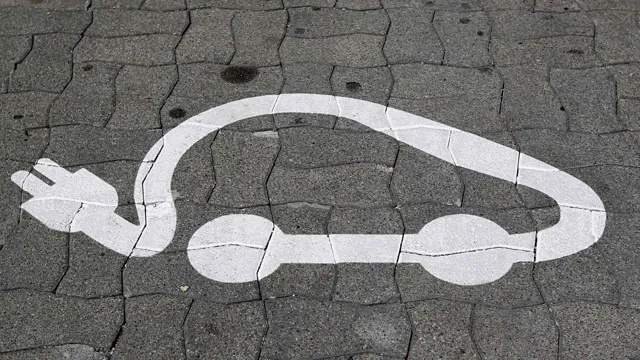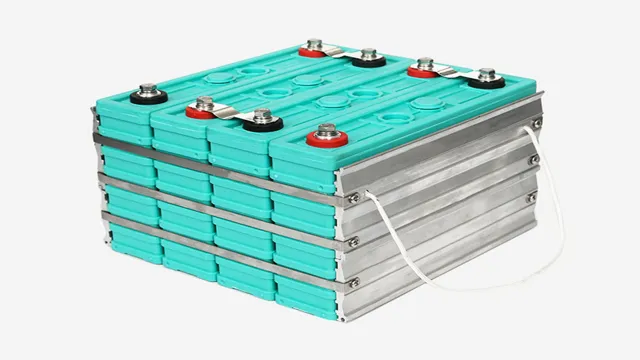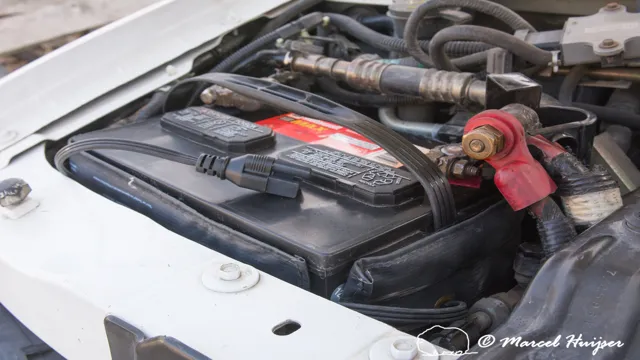10 Revolutionary Battery Breakthroughs for Electric Cars: The Future is Bright!
As technology continues to advance at an unprecedented rate, it’s no secret that the automotive industry is experiencing some revolutionary transformations. One of the most notable changes in recent years is the transition towards electric cars, which are increasingly being touted as the future of transportation. With their emphasis on sustainability and environmental friendliness, electric cars hold tremendous promise for the future.
However, there are still some major hurdles that need to be overcome before they can truly become mainstream. In this blog post, we’ll explore the ways in which electric cars are being revolutionized and their implications for the future of the automotive industry.
The Battery Breakthrough
Electric cars have been around for a while, but the one thing that held them back from mass adoption was the battery. However, for years, researchers have been working tirelessly to create a battery breakthrough for electric cars that would allow them to travel much farther on a single charge. Finally, that breakthrough may be here.
A new type of battery has been developed that has the potential to revolutionize the industry. This battery uses a solid electrolyte instead of the liquid electrolytes found in traditional batteries. The solid electrolyte not only allows for faster charging times, but it is also safer and less prone to overheating.
Additionally, this new battery has double the energy density of traditional lithium-ion batteries. This means that electric cars could potentially travel twice as far on a single charge. The battery breakthrough for electric cars is an exciting development that could lead to a cleaner and more sustainable future for transportation.
Exploring New Lithium-Ion Technology
Lithium-ion batteries have revolutionized the tech industry, providing us with portable power for our devices. However, there’s a new breakthrough in the field that could take things to the next level. Scientists have discovered a way to replace the graphite anode in traditional lithium-ion batteries with more efficient silicon anodes.
This new technology can potentially double the battery capacity of our devices, meaning they could last much longer between charges. Not only that, but silicon is also more abundant and less expensive than graphite, which could lead to more affordable batteries in the future. While this technology is still in the experimental phase, it’s exciting to think about the possibilities it could bring to our increasingly interconnected world.
Who knows, maybe one day we’ll be able to power our devices for weeks or even months at a time without needing to recharge. The future of technology is looking bright, and this battery breakthrough is just the beginning.

Benefits of Longer Battery Life
Having long battery life in our devices is a massive convenience and can make all the difference in our day-to-day lives. Having to constantly charge your phone or laptop can be a real hassle, but with recent technology advancements, it’s now possible to achieve a far longer battery life. This breakthrough has been a game-changer for many people, especially those who are constantly on-the-go or use their devices heavily.
With longer battery life, we can now use our devices for much longer periods without needing to worry about charging them. It also means that we don’t have to constantly carry around charging equipment and can be more mobile and flexible in our daily lives.
Charging into the Future
A new battery breakthrough for electric cars could be a game-changer for the industry. Researchers at the University of Warwick have developed a new type of battery that could provide electric cars with enough energy to travel up to 1,000 miles on a single charge. The new battery is based on a lithium-sulfur design that is more efficient than traditional lithium-ion batteries and can hold up to four times more energy.
This means that electric cars could travel much further on a single charge, reducing the need for frequent recharging. The researchers hope that this breakthrough could pave the way for a new generation of electric cars that are more practical and affordable for everyday use. With this new battery technology, electric cars could become a viable option for long-distance travel and road trips, reducing our reliance on fossil fuels and helping to reduce carbon emissions.
Fast and Efficient Charging Methods
Fast and efficient charging methods are constantly evolving to meet the demands of our increasingly digital world. As we rely more on our devices, we need charging solutions that are both efficient and quick. Thankfully, new innovations are being introduced all the time to make this possible.
For starters, there are now chargers that can charge multiple devices at once, cutting down on the need for multiple outlets and charging cables. Additionally, portable chargers have become a popular option, providing a way to charge on the go without needing an outlet. Wireless charging – where you simply place your device onto a charging pad – has also become increasingly common.
And as technology continues to evolve, we can expect even more fast and efficient charging methods in the years to come. With these charging solutions, we’ll be able to keep our devices powered up and ready to go at all times, without the need to constantly search for an outlet.
Creating a Sustainable Energy Source
Renewable energy sources are always a hot topic in discussions worldwide. The world has been experiencing drastic climatic changes due to the massive use of fossil fuels and it heavily impacts our environment. Hence, we need to shift our focus towards renewable energy sources to create a sustainable future.
The invention of electric cars and the introduction of sustainable energy sources like solar, wind, hydro, and geothermal power have provided promising solutions for a sustainable future. By using these sources of energy, we can reduce carbon emissions and protect our environment from further destruction. Governments worldwide have also taken a lead in promoting the use of sustainable energy sources and eradicating the use of fossil fuels.
The infrastructure for charging electric vehicles is also expanding, ensuring accessibility for all. It’s the perfect time to push forward towards a cleaner, renewable, and sustainable world.
Improving Battery Recycling Processes
As we continue to rely on technology in our daily lives, the demand for batteries continues to rise. However, the disposal of used batteries can have harmful effects on the environment. That’s why it’s important to improve battery recycling processes.
By doing so, we can reduce the amount of waste and pollution caused by discarded batteries. Fortunately, companies are making strides in developing more efficient and sustainable methods for recycling batteries. From extracting valuable metals to creating new batteries from used materials, these innovations are helping us move towards a more sustainable future.
So, let’s charge into the future with improved battery recycling processes and do our part in creating a cleaner, greener planet.
Impact on Transportation
The recent battery breakthrough for electric cars is set to have a significant impact on transportation. With the new technology, electric cars could have a much longer range than they previously did. This means that electric vehicles would become a more viable option for long-distance travel, reducing the reliance on traditional fossil fuel-powered cars.
Additionally, the new batteries could be more cost-effective to produce, making electric cars more affordable for consumers and potentially leading to more widespread adoption of the technology. The impact on the environment cannot be overstated either, with fewer emissions from cars resulting in cleaner air and a healthier planet. The battery breakthrough brings us one step closer to a future that is more sustainable and eco-friendly.
Reducing Carbon Emissions
As we strive to reduce carbon emissions and combat climate change, the transportation sector must be a significant part of the conversation. Transportation has a considerable impact on the environment, responsible for a vast amount of greenhouse gas emissions annually. To reduce these emissions, the transportation sector must undergo significant changes.
In recent years, there has been a move towards electrification in the industry, with many car manufacturers introducing electric vehicles to their range. While this is an important step, we also need to consider our behaviors and our reliance on personal vehicles. Alternative forms of transportation, such as cycling, walking, and public transport, can all contribute to reducing emissions and promoting a healthier, more sustainable way of living.
It’s essential to look at the bigger picture and consider the long-term impact of our individual choices and actions on the environment. We must work together to create a future that is cleaner, greener, and more sustainable.
Changing the Landscape of Transportation Industry
The transportation industry has undergone a massive transformation in recent years due to technological advancements. With the rise of ridesharing services and self-driving cars, the landscape of transportation has changed significantly. One major impact has been on the traditional taxi industry, which has seen a decline in business due to the popularity of ridesharing services like Uber and Lyft.
Additionally, self-driving cars have the potential to revolutionize the way people travel, as they offer increased convenience and efficiency while reducing the need for human drivers. This shift in transportation has not only affected businesses but has also created job opportunities in the tech industry. The impact of technology on transportation is undeniable and will continue to shape the industry in the years to come.
The Road Ahead
The race to develop a battery breakthrough for electric cars is gaining steam, as automakers and tech companies alike strive to make their battery-powered vehicles more efficient and reliable. Currently, the biggest hurdle facing the growth of electric cars is the limited range provided by current battery technology. However, a new generation of batteries is on the horizon that promises to significantly increase the range of electric cars, making them a viable option for long-distance driving.
These next-generation batteries will use advanced materials and new designs to pack more energy into a smaller size, allowing for longer driving distances and faster charging times. With this battery breakthrough, electric cars could become a mainstream choice for drivers looking for a green, cost-efficient, and reliable mode of transportation. The potential benefits of this technology are enormous, as it could significantly reduce emissions, decrease dependence on fossil fuels, and help combat climate change.
Yet, it remains to be seen which companies will be the first to introduce these new batteries to the market and usher in the next era of electric cars.
Conclusion
In a world where fossil fuels have dominated for so long, a battery breakthrough for electric cars is the spark that will ignite a revolution. With longer range and faster charging times, electric vehicles will become a more viable option for everyday drivers. It’s time to say goodbye to the gas pump and hello to a future powered by innovation and sustainability.
So, buckle up and get ready for a smoother, cleaner ride towards a brighter tomorrow!”
FAQs
What is a battery breakthrough for electric cars?
A battery breakthrough for electric cars refers to the development of new and more efficient battery technology that improves the performance and range of electric vehicles.
How does a battery breakthrough benefit electric car owners?
A battery breakthrough benefits electric car owners by increasing the range of their vehicle, making it possible to travel farther on a single charge. Additionally, improved battery technology can lead to faster charging times and longer battery life.
What are some examples of recent battery breakthroughs for electric cars?
Recent battery breakthroughs for electric cars include the development of solid-state batteries, which use a solid electrolyte instead of a liquid one, and the use of silicon in place of graphite as a key component of the battery.
What are the implications of a battery breakthrough for the future of transportation and the environment?
A battery breakthrough could have significant implications for the future of transportation and the environment. With more efficient and longer-lasting batteries, electric vehicles could become a more viable and mainstream option for consumers, leading to a reduction in greenhouse gas emissions and improved air quality. Additionally, improved battery technology could lead to the creation of new and innovative forms of transportation.






